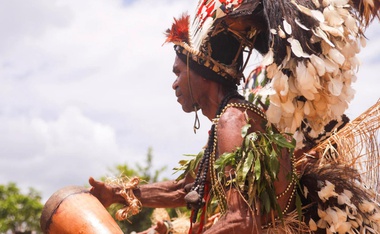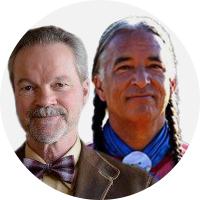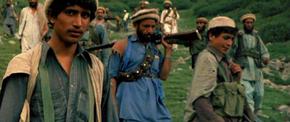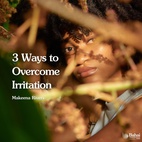The views expressed in our content reflect individual perspectives and do not represent the authoritative views of the Baha'i Faith.
In this installment of our Indigenous messengers of God series, we leave the Western hemisphere to briefly explore the Indigenous traditions and beliefs of the original peoples of Papua, New Guinea.
To do so, we’re privileged to speak with Craig Volker, PhD, Adjunct Professor in the Cairns Institute of James Cook University, Australia. Previously Craig was Professor of Languages at Gifu Shōtoku Gakuen University in Gifu, Japan, and Professor of Linguistic Research at Divine Word University in Papua New Guinea. His PhD in linguistics is from the University of Hawaii. He currently researches the Indigenous and pidgin-creole languages of the New Guinea Islands, while living in New Ireland, Papua New Guinea, where he is a Wangpaang – an Associate Talking Chief, an honorary chiefly title in Nalik society.
Q: Welcome, Craig! Please tell us how you became an honorary “Associate Talking Chief” (Wangpaang) among the Indigenous Nalik people of Papua New Guinea.
A: The Nalik society of New Ireland, Papua New Guinea is based on matrilineal clans, symbolized by totemic birds. Marriage within a clan is forbidden, and all public affairs such as marriages, funerals, memorials for the dead, and land ownership, are organized around relationships and debts between clans. In Nalik society, you cannot lobby or campaign to receive a customary title. Clan leaders (maimai — “chiefs”) observe men in their community and, at an appropriate time, give them a title and a role to play.
In my case, I was at a one-year memorial for Tamun, one of my language and cultural teachers, who was also a maimai of the clan into which I was placed. Because I was overseas when he passed away, I had not been able to attend his funeral, so I brought a pig to the memorial and was given permission to explain my relationship to my teacher and why I was honoring his memory with the sacrifice of a pig, which is a symbol of wealth in Melanesia. I should point out that part of my linguistic research has been describing the different registers of Nalik speech between older and younger people and between those with and those without traditional education, so I am able to speak in public using classical forms of Nalik, which many younger men are unable to do today. I am only the second white person to become fluent in Nalik, the other one being a German Catholic priest who was in the Nalik area in the years between the two World Wars.

After I had spoken and sat down, an elder maimai stood up and started to perform a bird dance, singing that someone had died who had much traditional knowledge, and asking to whom people could turn now that he had passed. Then he sang in front of me, telling me it was my responsibility, as I was now a Wangpaang. He had me stand up and placed a wild ginger around my waist, made a joke to the women about my new status, and gave me the title by the power of a specific plot of land. Not all wangpaang are appointed with the spiritual power inherent in a specific plot of land where ancestors are buried, so this was especially significant. An elder woman (this is a matrilineal society!) scolded the maimais that it “was about time” they gave me this recognition, and it was all over.
Only men with a title are allowed to speak at certain customary events. They speak on behalf of women and men without titles, and this is a role I occasionally perform, especially speaking on behalf of foreigners who bring traditional gifts to funeral events. A maimai is the political leader of a clan. In the past maimais would speak in a very high form of speech, using many metaphors and indirect references. Wangpaangs were expected to be knowledgable in traditional custom and would explain and elaborate on what maimais said. Today maimais tend to use more direct speech, so this interpretive role is less important. Nevertheless, men who are wangpaangs are people with traditional knowledge, who are expected to share that knowledge with younger people.
I see this service as analogous to the teaching and researching role of a professor. Often wangpaangs end up being made maimais later in life, but this is a role that I would not welcome for myself, as a non-indigenous member of the community. Having said this, I should point out that my appointment as Wangpaang (literally “Messenger,” but I translate it as “Associate Talking Chief”) of my clan is not honorary. “Honorary” implies that it is an honor without responsibility, like modern-day knighthoods. Sometimes visiting foreign dignitaries are given honorary titles in New Ireland. But the situation for a non-indigenous resident is different – it marks integration into the local society and as such, is an honor, but one that comes with the same responsibilities as an Indigenous holder of the title.
As a wangpaang, I consult with other elder men in the community on matters affecting customary law, and I have the right and duty to speak out in public and to any person on matters related to custom. On a local level, I do this to give my opinions about the role of language in schools, and I am used as a resource (especially as a linguistic resource) by younger people. On a national level, I have done this by, for example, objecting to the fundamentalist Christian speaker of Parliament removing traditional spiritual carvings from the House of Parliament – which I called in a newspaper article in one of the two national newspapers “religious terrorism on the same level as the Taliban.”
Regarding Tamun, I should point out that he was among the first people to accept the Baha’i Faith in Papua New Guinea, and was a founding member of the first Local Spiritual Assembly of the Baha’is – the annually-elected Baha’i council elected by plurality vote, with no nominations or campaigning allowed. Tamun served on the Local Spiritual Assembly of Madina Village, where I made my home in Papua New Guinea years ago.
At that time, Tamun was physically attacked by his own brother for helping to build the country’s first local Baha’i Centre. He was also the first Papua New Guinean to travel to spread the Baha’i message, going to Manus Island to teach the Faith, where he was imprisoned overnight by the Australian colonial officer there, who had orders to restrict the spread of any “Communist” or otherwise subversive ideology – clearly a gross misunderstanding of the Baha’i Faith. Tamun became the first Papua New Guinean to travel overseas for the Faith when he went to Australia to attend an international conference. There he gave a talk to the Australian Baha’i youth urging them to use the formal educational opportunities they had, and that he had lacked, to serve humanity.
For that occasion, Australian Baha’is bought him a suit and tie. He was already known as a rather stylish dresser, and as he became the first man in the village to wear a Western suit, he was given the nickname “Negro” to show how sharp a dresser he was. (African Americans were and are widely admired in Papua New Guinea.) He was physically very strong and had been a “shark caller” in his youth. He was very well versed in both secret and public traditional knowledge, much of which he generously shared with me.
Q: Thank you, Craig – what a remarkable story! Truth be told, I know next to nothing about Papua New Guinea. That’s why, after I recently read your paper, “The Indigenisation of the Baha’i Faith in New Ireland, Papua New Guinea,” Proceedings of the 8th Annual Conference, Association of Baha’i Studies – Japan, I wanted to find out more and contacted you. I’m glad I did. In your reply you wrote:
Thanks for including me in your indigenous spirituality conversation. I think this quest for indigenous messengers of God is important, as too often the Baha’i Faith is presented as an Abrahamic religion. It is that, of course, and Baha’u’llah spoke within his culture and historical setting, of course, but if it claims to be universal, then it needs to be presented as such, particularly if we are told that every people has had a messenger of God.
Do you think that the “indigenization” – which the dictionary defines as “the act or process of rendering indigenous or making predominantly native” – of the Baha’i Faith in the Americas is important as well? If so, why?
A: Yes, of course. We Baha’is understand our Faith as a universal religion, because the Baha’i writings describe it that way. As Abdu’l-Baha wrote:
The teachings of Baha’u’llah are such that all the communities of the world, whether religious, political or ethical, ancient or modern, find in them the expression of their highest wish.
For example, the people of religions find, in the teachings of Baha’u’llah, the establishment of Universal Religion – a religion that perfectly conforms with present conditions, which in reality effects the immediate cure of the incurable disease, which relieves every pain, and bestows the infallible antidote for every deadly poison. … But the essential basis of all the Divine Religions which pertains to the virtues of the world of mankind and is the foundation of the welfare of the world of man, is found in the teachings of Baha’u’llah …
In the same sense, this means at least some of the Baha’i writings need to be translated into every language, and the everyday practice of the Faith needs to be interpreted by every culture. Where this is not done, people are not attracted to the community. This happened when, for example, a revolution occurred in Iran, and a sudden Iranian influx happened in many communities in North America. In some of those local communities, the way of doing things became more culturally Persian and as a result, some North Americans felt they were entering a foreign space when they went to Baha’i meetings.
I have also seen the same thing in Japan. I worked many years at a Japanese university and am back in Japan as a visiting professor this semester. In the community near where I live in Japan, there is a very loving and warm community, but it is dominated by North Americans. Consultation is in English and follows Western patterns, and meetings are usually held in foreigners’ homes. Most Japanese people do not speak English and have little interaction with Westerners, so it is no surprise that those Japanese who do come are the unusual ones who are bilingual and have some Western connection through marriage or long residence abroad. As a result, to some Japanese people the appearance of the Faith seems very much a religion for foreigners – which it definitely is not.
The same is surely the case with American indigenous communities, who have suffered much from colonialism and who understandably are often wary of any religious group that comes clothed in the culture and patterns of the colonizers.
To me the Baha’i Faith does not replace the culture of anyone – it adds to our various cultures, and gives us the tools to appreciate other cultures better. We need to indigenize the Baha’i teachings in every culture, because Baha’u’llah said that this new Faith is for the entirety of humanity.

















Comments
Sign in or create an account
Continue with Googleor